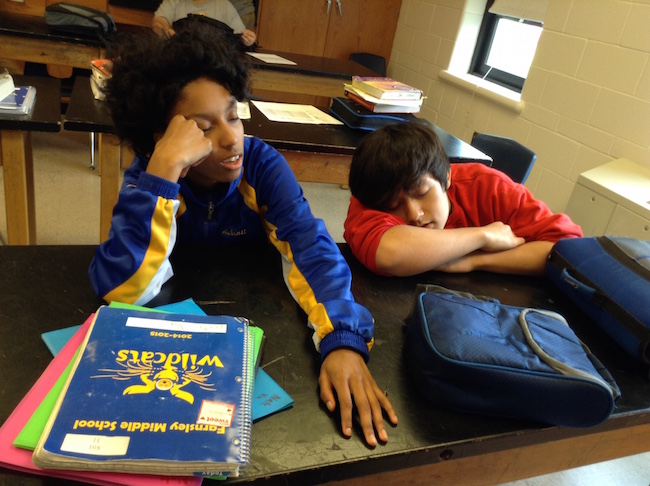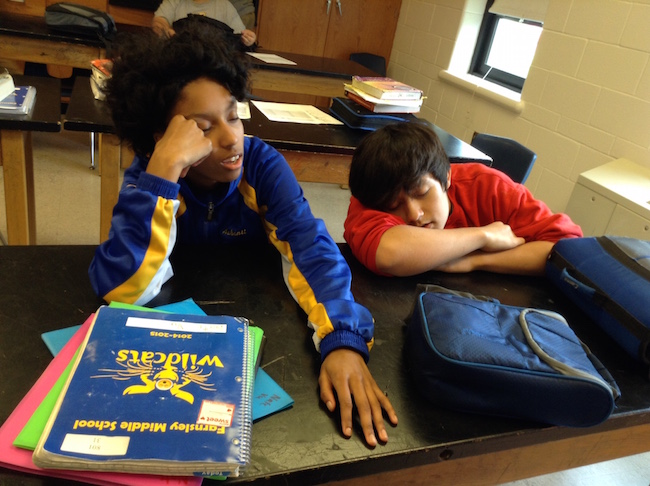You wake up… tired. You brush your teeth… tired. You get dressed… tired. Do you notice a theme? 
Teenagers across America are doing their daily routine at 6 in the morning TIRED! A study conducted by Stephanie Crowley and her team of researchers at Brown University, published in August 2014, shows that being tired is completely natural for all teenagers, and suggests that schools should start their day later in the morning.
According to Crowley, they used activity monitors to track how sleep habits in younger and older adolescents changed over the course of two years. The main findings were that their circadian rhythms shifted later as they grew older; in other words, children begin to fall asleep later as they mature and they resisted the hormones that signal you to go to sleep longer. This means that teens stay up later, but aren’t ready to get up early and are tired all day.
“This is one of the few studies that has tracked sleep behavior and circadian rhythms over the course of up to two-and-a-half years in the same adolescents,” says Crowley, who is the lead author of this study and now an Assistant Professor at Rush University Medical Center in Chicago. She was a graduate student at Brown when the study was conducted.
“A handful of studies have focused on sleep duration (length of time) longitudinally (as children age) but this is one of the first to look at sleep timing (when you go to bed) longitudinally,” she says.
According the study’s data, there were 38 9-to-10-year-olds and 56 15-to-16-year-olds—94 children in all. The children seemed to get less sleep as they became older. A 15-year-old child, for example, goes to sleep at 10:35 p.m. on a weekday and wakes up at 6:20 a.m., getting about 7 hours and 45 minutes a night. At age 17 they are going to bed at 11:05 p.m. and would wake up at the same time, getting about 7 hours and 15 minutes of sleep.
According to WebMD, 12 to 18 year olds are supposed to get about eight to nine hours of sleep every night. So, the children have about 45 minutes less sleep than they are minimally supposed to get.
Crowley’s team of researchers also measured how long the children resisted the main signal of their body to go to bed by measuring the increase of the sleep hormone melatonin in their saliva. Melatonin is the hormone that controls your sleep cycles, and it is also spread through your bloodstream as the evening wears on. This is important because the longer the child resists the signal, the groggier and more tired they will feel in the morning. The data showed that teens, as they grew older, put off the signal up to an hour longer, and stayed up about two hours past the time when their brains were ready to go to sleep.
The American Academy of Pediatrics (AAP) is concerned for children because of the negative effects of not getting enough sleep, which can include poor academic performance, obesity, depression, and even auto accidents. This has caused the AAP to recommend that school districts begin school no earlier than 8:30 a.m., so teens can get the sleep they need.
According to USA Today, there is a small but growing number of school districts in the US that have pushed back high school start times for these sleepy teens.
We conducted a survey involving 67 eighth graders, asking how long students slept at night and whether or not they feel tired or groggy upon waking up. We found that about 50 out of 67, or about 75%, of the eighth graders said that they feel tired in the morning upon waking up. We also found that 18 out of 67, or approximately 27% of students, said that they get 5 hours of sleep or less. This tells us that many teens—3/4 of eighth graders—a re drowsy when they get up in the morning. It also tells us that a little bit over a fifth of eighth graders get about three hours or more less then the recommended eight hours of sleep nightly. Leah Hornback & Joshua French

This work is licensed under a Creative Commons Attribution-NonCommercial-NoDerivs 3.0 Unported License

















i really liked this article. it talked about how waking up early is a problem for teenagers. Maybe could suggest how to fix this problem.
I really like the information in this article and I believe that more schools should pay attention to this information and change our time schedule.